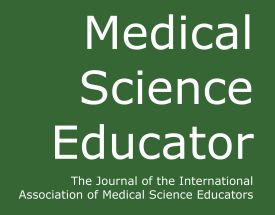
As many of you are aware, Publications Committee members agree to provide a monthly review of an article in Medical Science Educator (MSE). We hope to alert you to something you may have missed, or just spur you to revisit an issue you may have already looked at. We want IAMSE members to get the most of their association journal and to consider publishing their own educational research in MSE when the time comes. Remember access to the journal is a benefit of membership and you can do so by logging in at IAMSE.org and then clicking the IAMSE Publications tab.
In the latest issue, September 2017, the following article caught my attention, “Do Pre-Clinical Experiences Adequately Prepare Students for Their Pediatrics Clerkship: A Needs Assessment to Inform Curricular Development” (https://link.springer.com/article/10.1007/s40670-017-0422-4). As one of the newer medical schools, even though my school as a BS/MD Program has existed for 40+ years, we are in the process of adding the clinical clerkship years to our curriculum. This article addresses something many at my institution have been thinking about, which is to make sure that our curriculum prior to years 3 and 4 of medical school is adequately preparing our students across the board for their clerkship experiences. In this article, a simple survey was administered over a 2 year period at 4 medical schools under the aegis of a working group of the Council on Medical Student Education in Pediatrics. Although preliminary in nature, the sample size was adequate with more than 500 responses. The 4 sites were diverse in being both public and private and urban and rural, although they were concentrated on the East coast of the U.S. Across all 4 sites, the results were fairly consistent. Thirty-three percent of respondents did not feel that their preclinical curriculum had adequately prepared them for the pediatrics clerkship. The survey showed that 40% of students reported inadequate preparation for pediatric physical examination skills. The open ended comments section suggested that many students felt they needed more pediatric-specific medical knowledge, citing many areas such as childhood developmental milestones, childhood vaccines and vaccine-preventable diseases as well as pediatric preventative medicine. Though all schools surveyed were fairly consistent, the school with the most evidence of satisfaction in preparation for the pediatrics clerkship has made a concerted effort to insure that there is dedicated pediatric-specific content in each organ system block. Even with the limitations of this study, which are clearly delineated by the authors, I feel that there is good information to help curriculum committees in reviewing preclinical curriculum content, in our case even as we are putting in place the clinical curriculum.